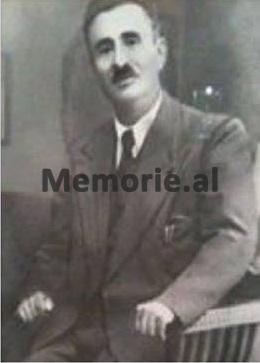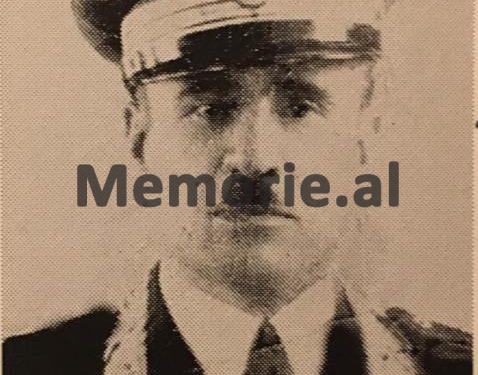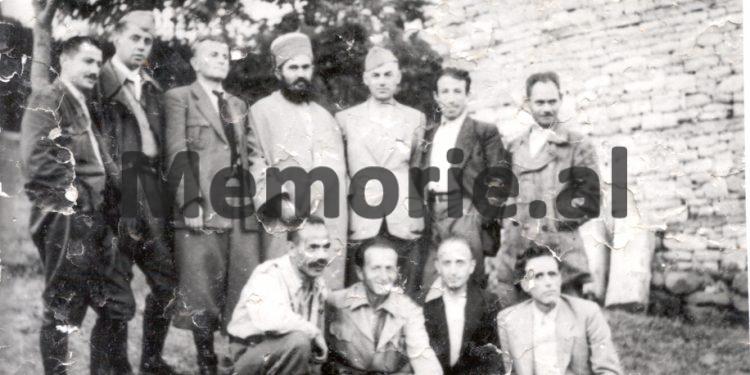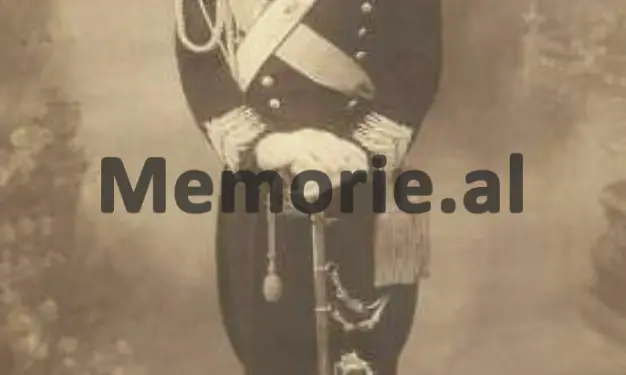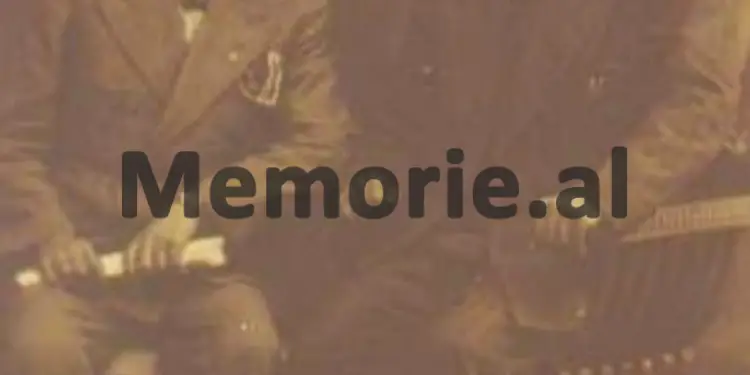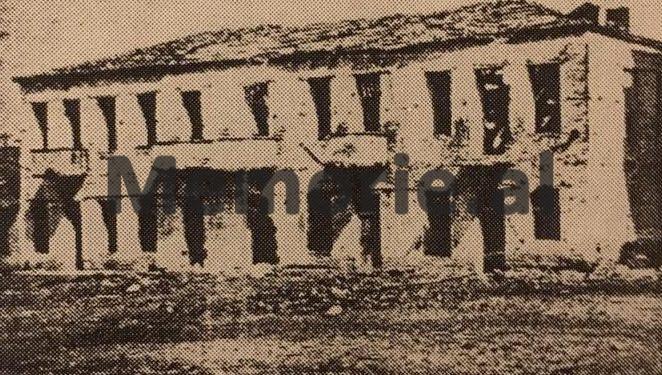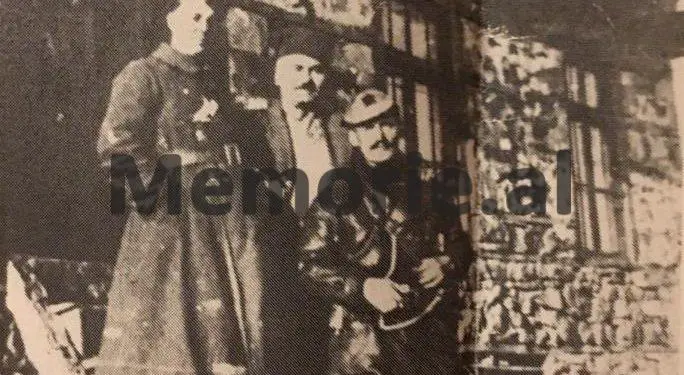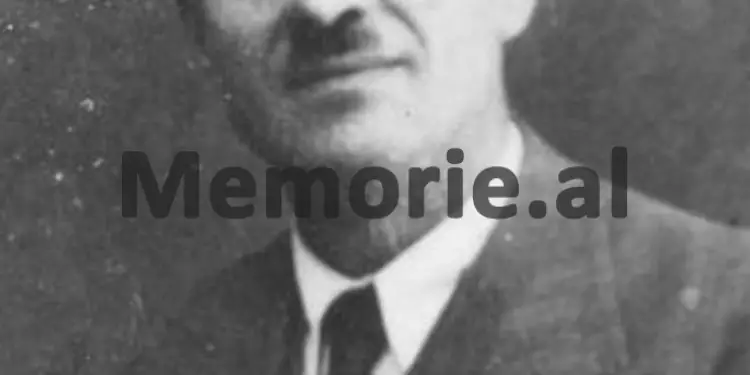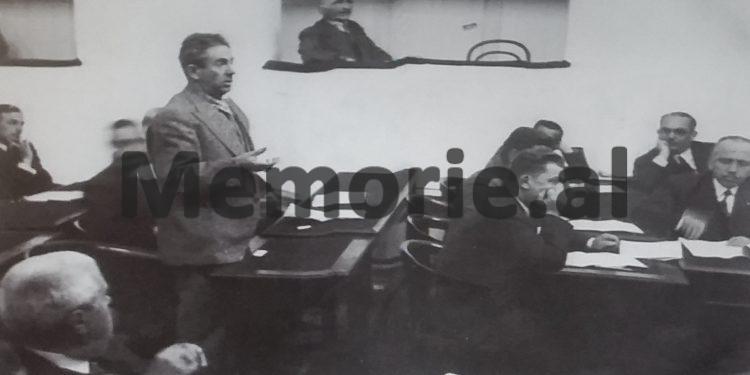Dashnor Kaloçi
Memorie.al publishes the unknown story of Riza Kishta originally from Gramsh where his family was one of the richest in that province and he could be educated first in “Normale” in Elbasan and then in the Military Academies of Istanbul and Florence in Italy, where he graduated in Artillery and Cavalry. Serving for two years in the National Guard as a loyal officer of Prime Minister Ahmet Zogu and being elected as a deputy in the Gramsh area where he served until 1936, being considered the “Quilt of the province of Vërçë”, for the care he showed for the poor villagers of that province. Appointment of Riza as Commander-in-Chief of the Gendarmerie of Gjirokastra and Peshkopi where he served until April 7, ’39, and then as Deputy Commander of the Gramsh Gendarmerie until ’43 when he was interned in Bergamo, Italy, after ‘ had fought against the partisans of Mestan Ujanik. Engaging in war at the head of a nationalist gang where in “Operation Winter”, he sheltered and assisted the General Staff of Enver Hoxha, rescuing him from a confrontation with ballistic forces in the village of Kishta. The election of Riza as a member of the General Presidency of the Democratic Front of Albania in the Congress of Përmet and the Presidency of the Antifascist National Liberation Council in the meeting of Berat, for the contribution he had given during the War. His candidacy for MP in the elections of December 2, ’45 where he won more votes than his rival and escaped to the mountains after the State Security pursued him to arrest him because of his links with the “Group of Deputies” and his tragic death under torture in the cells of Elbasan, where he had surrendered with his two sons, in order to save the family who had been interned in the Tepelena camp.
“Some time after the elections of December 2, 1945, when my grandfather, Riza Kishta, ran for deputy in the Elbasan Region as a candidate of the Democratic Front proposed by the Communist Party, surveillance and attacks on him began. At that time, the State Security called almost every day my father, Qemali, and asked him who his father, Rizai, was meeting, and who were the people who came home to talk to him. Seeing the situation he was in, and after talking at home for a long time, in September 1946, my grandfather, Riza Kishta, together with his two sons, Qemali and Qazimi, ran away from home and fled to the mountains. . After 17 months of escape, staying in the forests of Lushnja, Dumre and Gramsh districts, Riza Kishta with her two sons and other people who accompanied them during that time on the run, decided to surrender, notifying the Pursuit Forces. After surrendering, they were locked in the cells of the Internal Affairs Branch of the city of Gramsh and after being kept there for some time, they were all transferred to the Elbasan Internal Affairs Branch, where Riza Kishta died in torture, without coming out at all. in court ”. The man who speaks and testifies for the first time exclusively for Memorie.al is 78-year-old Hilmi Kishta, who tells the whole story of his family and grandfather, Riza Kishta, former officer of the Royal Guard of Zog, Commander of the Gendarmerie of Gjirokastra and Peshkopi and member of the Albanian Parliament from 1927 to 1936. Rizai, during the period of occupation of the country by the Italians was interned by Prime Minister Shefqet Vërlaci in Italy, after helping the partisan forces of Mestan Ujanik and during the war had rescued Enver Hoxha and some other members of the General Staff in the German Operation Winter of 1944. And for this, as well as for his contribution during the war, Rizai was elected a member of the Presidency of the General National Liberation Council in the Congress of Përmet, in May 1944 and then in the Meeting of Berat.
But who was Riza Kishta and what was the origin and past of his family? How could he be educated in the military academies of Turkey and Italy and why did King Zog remove him from the Royal Rank, running him for a member of the Albanian Parliament? Why did Riza Kishta refuse to attack the partisan forces of Mestan Ujanik and how did he manage to save Enver Hoxha and some other members of the General Staff during the fierce winter of 1944, from the confrontation they would have with the ballistic forces? ? What were the reasons that the former deputy of the Zog Monarchy, Riza Kishta, was elected to the General Presidency of the Antifascist National Liberation Council in the Congress of Përmet and then in Berat? Why in the elections of December 2, 1945 he accepted to run as a deputy of his constituency, proposed by the Communist Party as a representative of the Democratic Front led by Enver Hoxha and what were the reasons that forced him to flee to the mountains together with his two sons? What is the truth of Riza Kishta’s death in the cells of the Elbasan Branch of Internal Affairs in 1947 and how was his family and his entire tribe subsequently persecuted by the communist regime? For all these and other events and facts related to the figure of Riza Kishta, one of the rare personalities of the second half of the last century, who managed to be an MP in two regimes, we know many documents issued from the archives of the Albanian state, as well as the testimonies of his nephew, Hilmi Kishta.
Who was Riza Kishta?
Riza Kishta was born in 1897, in the village of Kishtë in the Gramsh District, where the early origin of that family is from, which, together with the Musai, Dërmishi and Shahini families, are among the most famous houses in that province. Kishta-t was one of the wealthy families of that area, and in addition to the large house (with two floors and 12 rooms), in the village of Kishta, she also owned several hectares of land and hundreds of sheep and pastures. Although Xhemal Kishta, the head of that famous family, was not himself educated and was only involved in the administration of his property, he wished to educate his two sons, Riza and Nazif, by sending them to study in Turkey. But Xhemali and his wife died at a very young age and their two sons were orphaned at a young age. After the death of both parents, with great difficulty Rizai was able to finish the Unike school (in Turkish), in his native village, Kishta. After that, some of the relatives of the family, as if to keep Xhemal’s will, took care of Riza and sent him to the city of Elbasan, where in those years the “Normal” school had just opened. During those years that Rizai attended classes in “Normale”, he was taken care of by some of the famous families of the city of Elbasan such as: Hasekiu, Peni, Dakli, Daiu etc. After Rizai graduated from the “Normal” school, graduating with high results, in 1914 he was appointed as a teacher of the Albanian language in the Municipality of Rishtan (which at that time was under the jurisdiction of Gramsh), where he served for several years. According to some testimonies of relatives of Riza Kishta’s family, it is said that during this period he met Ahmet Zogu, when he participated in the Elbasan Congress in 1917. Regarding the further activity of Riza Kishta, his nephew, Hilmi Kishta, testifies: “After Rizai served for several years as a teacher in the municipality of Rashtan, he was called by the mayor, Asllan Shahini, and was appointed secretary of that municipality. During the First World War, when the province of Gramsh came under the jurisdiction of the French military troops that were in Albania, in 1918, Rizai was transferred from there and was appointed as municipal secretary in Sojnik, where Refat Dermishi was chairman. After serving for several years as a teacher and secretary of those municipalities, in 1919, Rizai went to Istanbul and studied for a year at the Military Academy of that city, where he graduated in the Artillery branch, receiving the rank of lieutenant.
Graduation from the Military Academy of Florence
After graduating in the Artillery of the Istanbul Military Academy, Riza Kishta returned to Albania around the end of 1919 and after the Lushnja Congress in 1920, the Minister of Interior, Ahmet Zogu, included him in the list of officers who will to go to study in the military academies of Italy. After that, Rizai went to Italy and studied for two years at the Military Academy of Florence, where he graduated with honors in the Cavalry branch. In this regard, his nephew, Hilmiu, testifies: “After graduating from the Military Academy of Florence, my grandfather, Riza Kishta, immediately returned to Albania and Ahmet Zogu, who at that time was the Prime Minister, appointed him in one of the cavalry units that the Military Garrison of Tirana had at that time. After serving for several years at that unit, in January 1925, when the National Guard had just been re-established, Ahmet Zogu appointed Riza as an effective officer of that special unit. This appointment came after Rizai had shown signs of loyalty to him since June 1924, when he had refused to submit to the orders of the military who came out against Zog and joined the fanatical forces that undertook the armed uprising against the legitimate government of that time, headed by Shefqet Vërlac. In the Albanian National Guard, Riza Kishta served until 1927, being recognized as one of the loyal officers of the Prime Minister and President of the Albanian state at that time, Ahmet Zogu “.
Member of the Albanian Parliament in the years 1927-‘36
Regarding the departure of Riza Kishta from the National Guard, his nephew, Hilmiu, testifies: “At that time (1927), Riza Kishta left the National Guard and his escape was made at the direct request of Ahmet Zogu, who, appreciating him as one of the most loyal people, he proposed them to run for MP in the parliamentary elections. Riza accepted the proposal of the President, Ahmet Zogu, and ran in the parliamentary elections held that same year. Thus, Riza Kishta was elected as a deputy of Gramsh in the Albanian Parliament of that time, managing to be elected a member of the National Assembly that came out of that Parliament. During the years 1927-‘36, at which time Riza Kishta exercised two mandates as a deputy in the Albanian Parliament, he dealt a lot with the worries and problems that the inhabitants of his constituency in the province of Gramsh had. During those years, his house in Gramsh Church was an open door for all the inhabitants and Hallejians of that province. As a result of this and the help of the great support he gave to the people of Halle and the inhabitants of that province, Riza Kishta was considered and called “The quilt of the province of Vërçë”, testifies Hilmi Kishta, for his grandfather, Rizain, who after being A graduate of the military academies of Turkey and Italy, he served for several years as a Cavalry officer in the Albanian National Guard, to be later elected a member of the Albanian Parliament following a request and proposal made by Prime Minister Ahmet Zogu.
Debates of Riza Kishta in the Parliament of Zog in 1931
During the period of the Zog Monarchy, Riza Kishta was one of the most famous and very active deputies of the Albanian Parliament, reaching as secretary of the Commission for Prayers and Amnesty, which was chaired by the famous patriot Jashar Erebara, one of the most vocal potentials of that Parliament. According to the documents found in the archives of the Albanian state, it is known that during a parliamentary session, MP Riza Kishta asked the government to supply grain to the Gramsh highlands. Regarding this, the minutes of that parliamentary session state, among other things: “Mr. Riza Kishta. According to the answer given by the Minister of National Economy, we were satisfied, I just repeat and once again my prayer to the people of Gramsh to bring corn quickly, because it is raining in winter, the snow rails can not be brought at all. With the exception of a small number of families, I do not think that this corn should be given for free, but in exchange for working on the streets. “According to an estimate I made, Gramsci needs at least 3,000 quintals of corn.” In another session, Riza Kishta asked the government to implement the law it had adopted on pardons and amnesties, and as an example he took one of the villagers of his Gramsh constituency, who, and why he was pardoned by the government, continued to be on the run, as his name did not appear on the list of persons benefiting from that amnesty. In this regard, among other things, it says: “I am pleased with the word of Mr. Minister of Internal Affairs, and I remind his Mr. that the Ministry of Interior has notified the local authorities not to be prosecuted, that they will be introduced on the apology list. The letter of the Ministry has the number 647 / V m dated 2 / X / 1930, which I saw with my own eyes and its content is that the authorities of Elbasan are told not to prosecute these persons. After they will be forgiven. Why he was left without being added to the list, I do not know. “I just believe it will be forgotten.”
Governor of the Gendarmerie in Gjirokastra
After 1936, when Riza Kishta left the post of deputy, where he had served in two terms for ten years in a row, he returned to his private life, dealing with the property and wealth of his family. At that time he bought a large amount of pasture land in the village of Cerragë in the province of Dumre in Elbasan, as well as another plot of land, where he built a large house for his family. Even after the construction of this large house in the village of Cerragë, Riza Kishta did not move from his hometown, Kishta, but continued to stay where he had a large part of his family property. Meanwhile, after 1935, when the Fier Uprising was suppressed, King Zog took care to send in some of the prefectures that were considered the most problematic, as Commander of the Gendarmerie some of his most loyal and professionally trained people. Based on this, at the beginning of 1936, King Zog appointed Captain Riza Kishta as the Commander of the Gendarmerie in the Prefecture of Gjirokastra. In this regard, his nephew, Hilmi Kishta, testifies: “After my grandfather, Riza Kishta, served for almost three years in the position of Gendarmerie Commander in the Prefecture of Gjirokastra, in 1938, King Zog transferred him from there and sent him to the sub-prefecture of Bishopric. In that city, Rizai served in the same position until April 1939, when fascist Italy carried out military aggression, invading Albania. Thus, after the invasion of our country, Riza Kishta refused to serve in that position and resigned, returning to his native village, Kishta. After returning to the village, he stayed there, as in the village of Cerragë, where he had built the new house. In 1940, when the Italo-Greek war broke out, the Italians summoned Riza and appointed him to the post of Commander-in-Chief of the Gramsh area Gendarmerie. At that time, as in many other sub-prefectures, in the Gramsh sub-prefecture, the Italian occupation authorities began to form several paid militia battalions, which they needed to send to the war front with Greece. Also, in addition to these battalions that were created to assist the regular military forces of the Italian army that were on the war front with Greece, at that time several other militia units were created that would be used to guard order and calm in various prefectures that were considered the most problematic. At that time, in order to help many poor families in the province of Gramsh, Riza Kishta fictitiously recorded in the records of those wards many of his fellow villagers, who were paid regularly and received food and clothing. Hilmi Kishta testifies about his grandfather, Riza, for the period he served as Gendarmerie Commander in Gjirokastra and Peshkopi, as well as the help he gave to his fellow villagers, paying them salaries, ostensibly as members of the militia units of created by the Italians to maintain order and tranquility.
Exile in Italy, as he did not attack the partisans
Even after the end of the Italo-Greek War, Riza Kishta continued to serve as the District Commander of the Gramsh of the province of Gramsh. Regarding this period of time, his nephew, Hilmiu, testifies: “During those years that Rizai was in that position, in the area of Gramsh and other surrounding provinces, the first nationalist and partisan factions began to be formed. Assuming the post of Gendarmerie Commander, Rizai had the task of striking at those armed groups and squads, but he not only did not take any such action, but on the contrary, constantly assisted them. Although he was ordered several times to strike the partisan forces, Rizai never carried out such an order and never sent the militias he commanded to pursue the partisan forces. One of those squads that had the help of Riza Kishta was that of Mestan Ujanik (the first partisan formation that was created in Albania), in the Skrapar district, which was often supported by Rizai. The legendary commander and famous nationalist, Mestan Ujaniku, together with his gang, Riza Kishta sheltered them several times in his house. Likewise, in addition to that gang, at that time Riza Kishta maintained correct relations with the militia forces, such as those commanded by Xhaf Bali. During an armed attempt in 1942, when Xhaf Bali’s forces were badly defeated by the forces of Mestan Ujanik’s squad, the General Command of the Italian Army in Albania, in his aid, sent gendarmerie forces (mainly men from the area of Verca) commanded by Riza Kishta. But, although Rizai with the gendarmerie forces he commanded went to the place where the struggle was taking place between the forces of Mestan Ujanik and those of Xhaf Bali, he refused to enter the fight against the partisan forces of Mestan Ujanik, stating: “They are also our boys ”. Seeing Riza Kishta’s benevolent attitude towards the partisan forces, and not implementing the order of the General Command of the Italian Army in Albania to go to the aid of Xhaf Bali’s militia forces, the government of Prime Minister Shefqet Vërlaci (with which Rizai did not had good relations), issued the order and deported Riza to Italy “, testifies Hilmi Kishta, regarding the action of his grandfather, Riza Kishta, former District Commander of the Gramsh Gendarmerie, who ended up deported to Italy, because he did not implement the order to strike Mestan Ujanik’s partisan gang.
How Riza’s exile in Italy was prepared
After Riza Kishta had not carried out the order of his superiors to go to the aid of the Italian militia forces of Xhafer Bali, which were fighting against the partisan gang commanded by Mestan Ujaniku, the Ministry of Interior in Tirana ordered the disbandment of the militia battalion which he commanded, which, in its composition had about 600 forces. Also, after this action, the Ministry of Interior ordered the police stations of Berat and Elbasan to organize the continuous surveillance of Riza Kishta and his activity. On January 16, 1943, the General Director of Police, Papalilo, informed the government of Tirana about Riza’s political danger. In this regard, it is the letter of the Supreme Carabinieri Command (AQSH. Letter with no. Prot. 4900. Date 7.12.1942) and a memorandum dated 13.11.1942, for the internment of Riza Kishta as a high risk element to the fascist authorities, as well as many other documents found in the Central State Archive in Tirana. After that, seeing the great authority and popularity enjoyed by Riza Kishta, not only in his province, to avoid any incidents or riots that his supporters might commit, the Italian authorities took care that his deportation to Italy was done as much as possible. more camouflaged and without fuss. They prepared a trap for him, giving him permission to flee to Italy, where he would accompany the two boys who were going to Florence for studies. On October 30, 1942, Rizai, wearing the uniform of the Carabinieri captain, left for Italy and five days later he was summoned to the Carabinieri of Florence, ostensibly for a meeting, where he was arrested and disarmed. After that, by order of the King’s viceroy in Tirana, Rizai was interned in an isolated Alpine place in northern Italy (in the Bergamo region, Guandino Municipality), where he stayed for almost two years. After the end of the internment period, some of his friends, personalities of the political and social life in Albania, intervened with the government of Tirana and the Italian authorities, so that he could be released and return to his home. As a result of these interventions, on June 17, 1943, Rizai, together with his friend, Zef Çoba from Shkodra, were released and returned to Albania.
Commander of a nationalist gang
After returning to Albania, Rizai came in contact with the main leaders of the nationalist organization “Balli Kombëtar”, such as Mit’hat Frashëri, Abaz Ermenji, etc., and after talks with them, he formed a nationalist gang in his area of Gramsh (by were its own commander), which numbered about 800 armed forces. Regarding the activity of Riza Kishta after returning from exile, testifies the former partisan Murat Rustem Kasapi (from the village Karbunarë of Lushnja), who, among other things, states: “I was a partisan of the Myzeqe battalion and at that time I fought in the area of Lushnja, Peza, Dumre, Shpat, Elbasan and Gramsh. In 1943, when our battalion moved to the Gramsh area, I met Riza Kishta, who was the commander of a nationalist gang. At that time, I and some partisans of another gang were accompanying to that village the children of our commander, Rrahman Ruçi. At the entrance to Gramsh we met the Chechen ballistas and fought for four hours with them. At that time, Riza Kishta was notified and he, through a courier, sent a letter to the commander of the ballistae, in which it was said: ‘Allow the partisan platoon to pass immediately without touching anyone with your hand, otherwise you will have consequences ‘. After that, the ballistas immediately opened the siege and left, while we passed quietly in the area of Vërrçë. In conversations with Rizana, I learned that he had been an academic officer and had served in the Royal Court of Zog, as well as a member of the Albanian Parliament. It was not the first time Rizai had helped the partisans. He, since 1942, had made a compromise with the partisan gang of Mestan Ujanik, to fight against the Italians. “For this, the quisling government deported him to Italy.” Regarding the compromise that Riza Kishta made at that time with the partisans, his nephew, Hilmiu, testifies: “On September 4, 1944, Riza Kishta sent a letter to the commander of the partisan forces, Xhemal Llalla, that they should meet in Gramsh. The purpose of this meeting between the partisans and the nationalist forces of Riza Kishta was to reach an agreement for them to stop the fratricide. The meeting took place in Gramsh and Rizai signed the agreement, although the partisans set very difficult conditions for him “. Regarding this agreement, the former partisan cadre, Kadri Musai, in his memoirs (Gramsh Museum. P. 271) wrote: “We did not agree, but nevertheless we agreed by setting some conditions that the ballistas did not agree, the meeting not to be blamed on them ”.
Saves Enver and the Staff from confrontation with the ballists
At the time Rizai had formed his nationalist gang operating in the Gramsh area, he gained a great name and authority, from both partisan and nationalist forces. In this regard, his nephew, Hilmi Kishta, testifies: “As my father, Qemali, told me, in January 1944, when the German Winter Operation began, Enver Hoxha, with a part of the General Staff, was sheltered in our village Church. Before coming to the Church, Enver Hoxha, through a courier, sent a letter to Riza, where he told him that he was coming to take refuge there and asked him to take measures for the safety of the comrades of the Staff, as he had knowledge that there was also a ballists squad. Rizai, after receiving the letter, called his close friend Lime (Halim) Musa and sent him to appear before the General Staff and pick them up at his house, which was next to ours. While Enver Hoxha, with other friends of the General Staff, came and took refuge in the house of Lime Musa. In another house, which was very close to where they were, there was also a squad of ballists. Although Enver and the headquarters knew that the ballistas were there, and also the ballists knew that Enver and the headquarters were next to them, no incident occurred between them, although at that time “Balli” and the partisans had been at war for some time. in between. This happened for the sole reason that Enver Hoxha’s headquarters, as well as the ballists, could not take any action in that village without the permission of Riza Kishta, who had taken them in trust. After Enver and his staff were calm at Lim Musa’s house, where Rizai had assigned them, they asked him to help them leave. After that, Rizai sent his men, who accompanied Enver to Grabova and there they found other companions to escort them to the province of Gora, where they would go. Regarding this event, in his memoirs (Book IV, bot. 1970) among others, Enver Hoxha wrote: “These (Riza Kishta and his people) knew well the situation and the families that supported the National Liberation Movement, and “surely if they had intended to carry out a check, Uncle Halimi’s house would have been the first.” Likewise, at that time, Mehmet Shehu highly appreciated the contribution of Riza Kishta for the benefit of the Anti-Fascist War. In a letter he sent to the General Staff at the time, (selected work, vol. I. p. 238), he wrote, among other things: admirers “.
Elected to the Antifascist Council at the Përmet Congress
Seeing and appreciating the stance of the nationalist Riza Kishta and his activity as anti-fascist, the main leaders of the Communist Party who led the Democratic Front at that time, elected him as a member of the Presidency of the General Anti-Fascist National Liberation Council, at the Berat meeting, which carried out the works from 20 to 23 September 1944. In this regard, his nephew, Hilmiu testifies: “As my father, Qemali, told me at that meeting, one of the discussants had risen up and had mentioned Cen Elezin badly. and Riza Kishtën. Immediately after him, Baba Faja Martaneshi asked for the floor, who took Riza under his protection, and after that, he was unanimously elected as a member of the Presidency of the General National Liberation Council “. Also, a few months ago, in May 1944, when the Përmet Congress took place, Riza Kishta was elected a member of the Presidency of the Democratic Front of Albania. Regarding this, the former partisan Murat Kasapi, testifies: “At the Përmet Congress, where I was present myself, even though Riza Kishta was not there, he was elected in absentia as a member of the Presidency of the Democratic Front of Albania. Later, at another meeting of the Front that took place in Tirana, at the end of 1944, he was again proposed as a member of the Presidency of the Front. At the meeting that Rizai himself was present, he objected and said: “There are others who have given more to this war than I do and they are younger.” After that, Abdyl Këllezi stood up and said: “In order not to embarrass people, when he does not want to, there is no problem”.
December 2, 1945, runs for MP with the Democratic Front
For the great contribution that Riza Kishta had given during the war, as well as for the undisputed authority he enjoyed in the whole area of Gramsh and Elbasan, the Communist Party decided that he should run in the elections of December 2, 1945, as a representative. of the Democratic Front. Although he was elected to run for the Front, the main leaders of the Communist Party instructed their people to support the candidacy of Kadri Musa and not Riza Kishta. This was related to some information from the State Security, which accused Riza of having links with a group of intellectuals (the Group of Deputies who were later convicted), who, in cooperation and with the support of the Anglo-American missions in Albania, were making attempts to form an opposition within the ranks of the Democratic Front. Thus, after those elections, Kadri Musai won 4738 votes in favor and 208 against, while Riza Kishta, 2510 votes in favor and none against. In this regard, his nephew, Hilmiu testifies: “The top communist leadership at that time began to view Riza Kishta with suspicion and therefore did not support him in those elections. This had started since the end of the War, when my father Qemali, (former guerrilla), who at that time worked in the Presidency of the Anti-Fascist Youth Union (BRASH), was asked about his father, Riza. Qemali was often called and asked who his father, Rizai, was meeting, and who were the people who came to his house to meet him. After that, Security surveillance began against Riza, who came to his house and put pressure on him, asking him to hand over the pistol he had used during the war. This request was quite clear and it meant that he was on the verge of arrest, as this scheme (request for surrender of weapons) was also used with other nationalists who were subsequently arrested. Seeing the difficult situation in which he was, grandfather Rizai went to Çërragë and called home his two sons, Qemal (my father), and Qani, and talked at length with them. After that, in September 1946, the three of them settled down and fled to the mountains “, testifies Hilmi Kishta, regarding the escape of his grandfather Riza, who was in danger of being arrested by the communist regime of Tirana.
Escape and death in the cells of Elbasan
At that time, Riza Kishta and his two sons, Qemali and Qani, had fled and were hiding in the forests of Lushnja, Dumre and Gramsh, and some of their cousins, such as Shazo Ismaili, etc., joined them. In this regard, his nephew Hilmiu testifies: “Immediately after the escape of his grandfather and his two sons and nephews, the Pursuit Forces came and seized all the property that our family had, as well as the two-storey house in Çërragë, which they turned into a school. for children. After that, our grandmother, Refaien, (Riza’s wife), along with three other boys, were sent into exile in Berat and then to the terrible Tepelena camp. While they were in exile, Grandpa Rizai, with my father, Qemali, and uncle Qani, and cousins who had fled to the mountains, fell several times into the ambushes of the Pursuit Forces that followed them everywhere. At that time, Ali Turbohova, (one of the other expatriates fleeing to the mountains), proposed to Grandpa Rizai to flee abroad with his men, as they would also have the help of Anglo-American missions operating in Albania at the time. But Riza Kishta did not accept that suggestion and seeing the difficult situation where they were, as well as the grandmother with the three other boys who were suffering terribly in Tepelena, together with the two boys, decided to surrender. After staying on the run for 17 months, they surrendered in the village of Kishta. After the surrender, grandfather Riza and his two sons, and their cousins were kept isolated in Gramsh for some time, and then sent to the cells of the Internal Branch of Elbasan. As my father Qemali told me, during the investigation, they were tortured the most inhumanely and as a result of that treatment, grandfather Riza Kishta died in his cell, because he could not afford them. Father Qemali, with his uncle Qani, appeared before the court on January 17, 1948, accused of “attempting to overthrow the popular power in cooperation.” After that, Qemali’s father was sentenced to five years in prison, while Qaniu was sentenced to detention. “While my father served his entire sentence and was released from prison in 1953, our whole family suffered the terrible class war until 1990,” concludes Hilmi Kishta, his family and grandfather Riza Kishta, the former officer. Zog National Guard academician and MP of the Monarchy, who died under torture in the cells of Elbasan in 1947, after being accused of being a member of the “Group of Deputies” who wanted to form a liberal opposition within the ranks of the Democratic Front./Memorie.al





